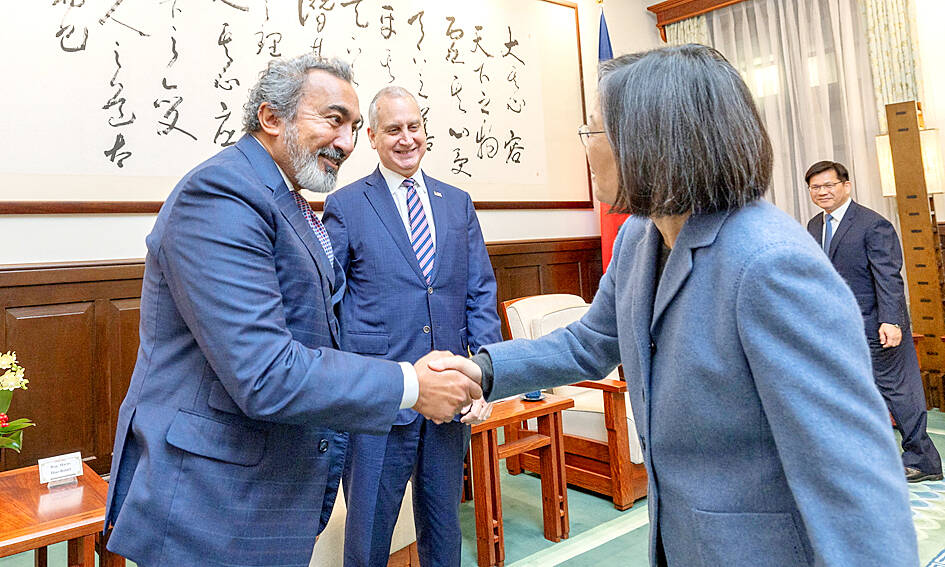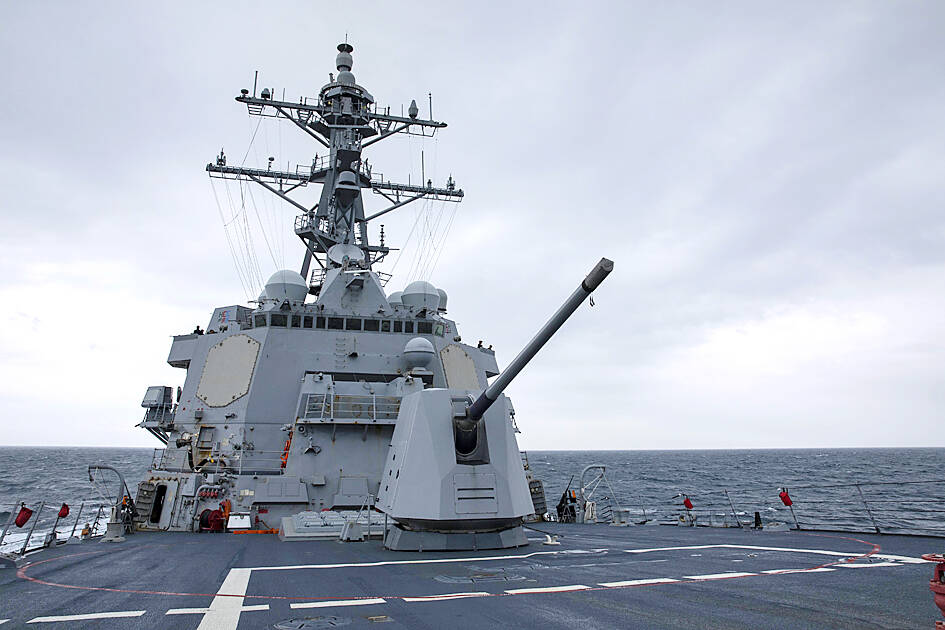A visiting US lawmaker yesterday expressed confidence that US support for Taiwan would remain strong regardless of the result of the US presidential and congressional elections in November.
US representatives Mario Diaz-Balart and Ami Bera, cochairs of the US Congressional Taiwan Caucus, are in Taiwan for a three-day visit to show solidarity with the nation and strengthen ties between Washington and Taipei.
The strong bipartisan understanding and support for Taiwan in the US Congress “will remain regardless of who is in the White House,” Diaz-Balart said. “That’s reflected by us being here today.”

Photo: Presidential Office via Reuters
Before the inauguration of Taiwan’s new president in May, Beijing is expected to “do some things,” Bera said.
“My message to Beijing is: Don’t do that. Let’s take a different path forward to maintain the status quo to maintain peace and prosperity in the region,” he added.
The US and its allies in the region are not seeking conflict, but peace and prosperity, he said.

Photo: US Navy via AP
Taiwanese exercising their right to vote and choose their own future is “nothing provocative,” he added.
The delegation is sending a message to the world that the US continues to stand with Taiwan and pressure or coercion would not be tolerated, Diaz-Balart said.
“The people of Taiwan again, once again, leading and showing what democracy looks like. And that’s a threat to the Communist Party of China, but so be it,” he said.
During their meeting with President Tsai Ing-wen (蔡英文) earlier yesterday, Diaz-Balart said that US lawmakers are well aware of the Chinese intervention in Taiwan’s elections and the “dramatic contrast” between China and Taiwan, which he called a “shining star of freedom, of prosperity, of democracy.”
The US Congressional Taiwan Caucus — which is led by four bipartisan cochairs including Republican Diaz-Balart and Democrat Bera — being the biggest caucus in the US Congress demonstrates the US people’s firm support for Taiwanese, Bera said.
It is not the people in the US or Taiwan who choose to alter the “status quo,” he said, adding that “it is incumbent upon us, as democracies, as people who believe in freedom, to address those aggressions” from China.
As this year marks the 45th anniversary of the promulgation of the Taiwan Relations Act, its core principle — Taiwanese should be able to choose their own path forward and their own future — is to “stay steadfast and true,” he said.
Tsai thanked the two lawmakers for visiting Taiwan to show their support and the caucus for releasing a statement to congratulate Taiwan on the success of its democratic elections on Jan. 13.
The caucus has played a particularly vital role in deepening economic and trade relations between Taiwan and the US, such as calling on Washington to negotiate a free-trade agreement with Taipei and including Taiwan in the Indo-Pacific Economic Framework for Prosperity, she said.
Tsai added that she hoped the issue of double taxation between the two sides could be resolved soon.
Taiwan is to continue to move forward on its democratic path, she said, adding that the nation’s cooperation with the US and other countries would strengthen the democratic camp and create global prosperity.
In a separate meeting with president-elect Vice President William Lai (賴清德) yesterday, Bera said that the administrative and legislative branches of the US government and its people are to continue working with Taiwan to ensure regional peace and prosperity.
Democracy, freedom and human rights are the most valuable assets of Taiwan and the core values it shares with the US, Lai said.
Lai added that he hoped the US Congress would continue to support Taiwan in strengthening its self-defense capabilities, which would help further enhance the Taiwan-US partnership, and drive regional and global prosperity and development.
In other news, Arleigh Burke-class destroyer the USS John Finn transited the Taiwan Strait on Wednesday, the US Navy said.
In a statement, the US 7th Fleet said the John Finn’s transit “demonstrates the United States’ commitment to upholding freedom of navigation for all nations as a principle.”
“The ship transited through a corridor in the Strait that is beyond the territorial sea of any coastal state,” the 7th Fleet said.
The Ministry of National Defense confirmed that a southbound US Navy ship had passed through the Taiwan Strait.
The ministry said it was closely monitoring the waters and airspace around the Taiwan Strait as the ship was making the transit, and nothing unusual was observed.
Additional reporting by CNA

The CIA has a message for Chinese government officials worried about their place in Chinese President Xi Jinping’s (習近平) government: Come work with us. The agency released two Mandarin-language videos on social media on Thursday inviting disgruntled officials to contact the CIA. The recruitment videos posted on YouTube and X racked up more than 5 million views combined in their first day. The outreach comes as CIA Director John Ratcliffe has vowed to boost the agency’s use of intelligence from human sources and its focus on China, which has recently targeted US officials with its own espionage operations. The videos are “aimed at

STEADFAST FRIEND: The bills encourage increased Taiwan-US engagement and address China’s distortion of UN Resolution 2758 to isolate Taiwan internationally The Presidential Office yesterday thanked the US House of Representatives for unanimously passing two Taiwan-related bills highlighting its solid support for Taiwan’s democracy and global participation, and for deepening bilateral relations. One of the bills, the Taiwan Assurance Implementation Act, requires the US Department of State to periodically review its guidelines for engagement with Taiwan, and report to the US Congress on the guidelines and plans to lift self-imposed limitations on US-Taiwan engagement. The other bill is the Taiwan International Solidarity Act, which clarifies that UN Resolution 2758 does not address the issue of the representation of Taiwan or its people in

US Indo-Pacific Commander Admiral Samuel Paparo on Friday expressed concern over the rate at which China is diversifying its military exercises, the Financial Times (FT) reported on Saturday. “The rates of change on the depth and breadth of their exercises is the one non-linear effect that I’ve seen in the last year that wakes me up at night or keeps me up at night,” Paparo was quoted by FT as saying while attending the annual Sedona Forum at the McCain Institute in Arizona. Paparo also expressed concern over the speed with which China was expanding its military. While the US

SHIFT: Taiwan’s better-than-expected first-quarter GDP and signs of weakness in the US have driven global capital back to emerging markets, the central bank head said The central bank yesterday blamed market speculation for the steep rise in the local currency, and urged exporters and financial institutions to stay calm and stop panic sell-offs to avoid hurting their own profitability. The nation’s top monetary policymaker said that it would step in, if necessary, to maintain order and stability in the foreign exchange market. The remarks came as the NT dollar yesterday closed up NT$0.919 to NT$30.145 against the US dollar in Taipei trading, after rising as high as NT$29.59 in intraday trading. The local currency has surged 5.85 percent against the greenback over the past two sessions, central